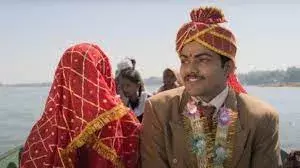Happy Women’s Day Laapata Ladies
It unearths heaps of refreshing, wholesome, women centric issues;

If you haven’t watched ‘Laapata Ladies’ then you haven’t missed much. Except perhaps the delicious layers of an India that is lost. Not only to the world but also to the upper crusts of all urban Indians.
Taking into account the phallic patterns dominating our villages, the film is neatly sliced with a sharp knife dipped in ironical humour. The name aptly justifies the storyline too because ‘Laapata Ladies’ is like the proverbial lost-and-found box.
A place where women who are lost to the outline of the world, have to ‘adjust’ themselves in congested spaces, until someone finds them. A vault where ridiculous truisms are trotted out to keep women on track.
For those wanting lessons in patriarchy, or how the ladies of the house, back in the day, learned how to work their way around it, this film is a must. In a world shaped by men, it is always with trepidation that feminine trembling fingers point at education and careers.
Due to the doctrines of coverture, even if they are allowed to adopt the title of their husband, it is with hesitation that they have to say-out-loud the name. And to get out of the lost-and-found strongbox, either to reunite with their loved ones or pursue their dreams, they also have to fight a system that is casually misogynistic, comically wonky, critically judgemental and disparagingly discriminatory. But. The film also underlines the fact that if she is determined to embark on a journey of self- discovery, a woman will not only reach her goal, but along the way, also help others like her who have lost their identity, to find themselves.
In this gently biting satire of a rural social drama, you also get to unearth heaps of refreshing, wholesome, women centric issues that celebrate the resilience, strength and empowerment of women. In a hilariously non-preachy way. Even the patriarchal tool called the ‘veil’ (the pivotal mess from which the story takes shape), is portrayed with satire.
But one message is clear. Whether it is from behind the ‘burqa’ or under the ‘ghoonghat’; whether she is a mother, sister, or related by law; and whether she covers her face or not, in a village untouched by feminism, a woman is still a faceless entity, deprived of the oxygen needed to breathe freely.
And in this male controlled crowd, if these feminine dependent loners want to score a fair chance, they have to navigate through the fiery pits of masculinity. Sometimes, women are also their worst enemies, because even if they are adept in becoming good daughters-in-law, sisters-in-law and mothers-in-law, they never know how to become good friends. And it is precisely this metaphorical secret that the movie sets out to unveil.
The raw representation of innocence, simplicity, camaraderie, self- growth and development among the characters not only warms your heart and freshens your mood but at times also feels like a tight slap on the social stereotype. The essence is captured with a visual language that is both poetic and profound.
Apart from never missing a chance for a comic punch, it also shows love, self-reliance, empathy and wins you over with its genuineness. Thus making even the complicated simple.
There comes a point in Bollywood, when you’ve heard a lecture far too many to turn you into a philosopher; too many toxic pseudo feminist tales to tire you; too much mindless violence of alpha male ‘Animals’ to make you nauseous. And, too much opulence and stardom to send you in a state of awe; too much skin show and erotic numbers to thrill your thoughts; too much vulgarity and cuss words to give you a headache; too many irritating special effects and tedious action to trigger your ire; and too much tokenism, feminism, patriotism, jingoism and ‘whaterverisms’ cluttering the screens, to cloud your sense of reasoning.
What you sometimes need is to relax and enjoy a movie that doesn’t underestimate the intelligence of the audience. A refreshing and believable storyline that soars beyond the ordinary. Sometimes all you need are earthy actors not stars who can bring a certain innocence to the table.
Sometimes all you need are the comforting sights of railway stations, tea stalls, dank liquor kiosks and the charm of a rustic village. Sometimes all you need is a message to be delivered with a power and poignancy that is both inspiring and invigorating.
An emotionally transcendent ambience that is sweet and easy like a lazy Sunday afternoon. Something like ‘Panchayat’ or ‘Twelfth Fail’. Sometimes all you need is for diffidence and delusion to be lost. And a sense of identity and self-worth to be found.
This delightful ode to female bonding is a perfect watch for Women's Day, where you not only get to see the importance of standing together in the face of adversity but are also forced to ask some disconcerting questions.
Why does a woman get lost? When her bright personality is obscured, cloaked and shrouded in a veil. Where does a woman get lost? When she is left behind in the chaos of a patriarchal crowd.
When does a woman get lost? Only if she wants to!
What a woman truly needs is respect. And instead of always being closeted in someone’s sightline, she needs a space of her own. The answers of the ‘Whys’ the ‘Wheres’ and the ‘Whens’ are so well narrated in this simple story of gut, grit and warmth, that you walk out wondering why it took so long for someone to tell it.

